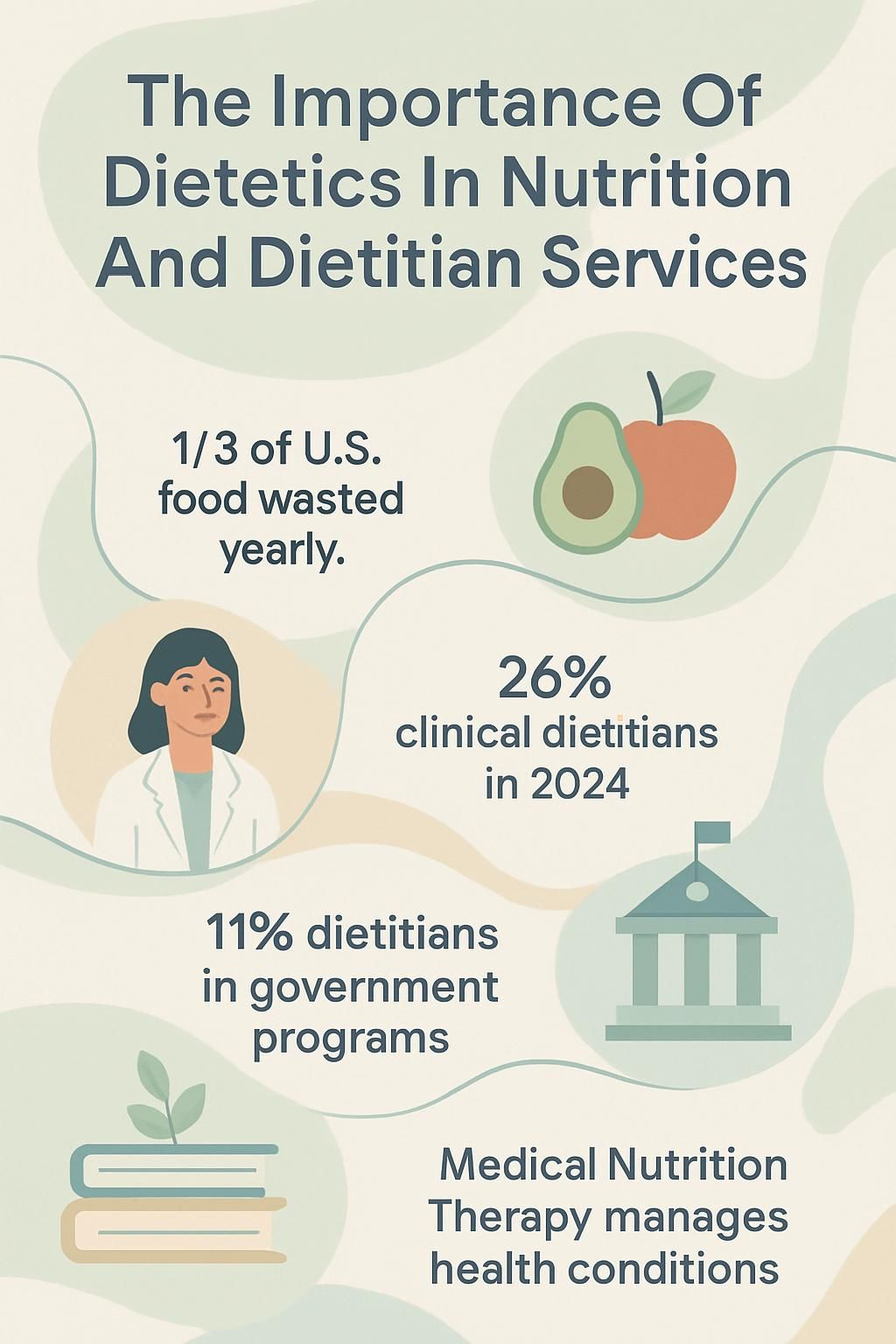The Importance Of Dietetics In Nutrition And Dietitian Services
Our Nutrition Assistant AI Suite will transform your body. You will lose fat, get toned, and build muscle. Gain confidence and optimal health.
Choosing healthy foods can feel confusing, especially if you are also managing a health condition. Dietetics, the science of food and nutrition, gives you clear steps to plan meals and protect your health.
The Academy of Nutrition and Dietetics notes that safe storage keeps fruits and vegetables nutritious, which shows why simple habits matter for wellness. In this article, you will learn what dietitians do, how programs in dietetics prepare them, and how expert guidance supports your goals.
Keep reading to see how practical knowledge from dietetics turns into better everyday eating.
Key Takeaways
- Dietetics relies on evidence, including Medical Nutrition Therapy, to manage diabetes, obesity, and heart disease under the care of an RDN.
- Registered Dietitian Nutritionists complete an ACEND-accredited DPD program, finish supervised practice hours, then pass the national Registration Examination for Dietitians.
- As of 2024, about 26 percent of dietitians worked in clinical roles, and nearly 11 percent served in government settings that support public health programs like the National School Lunch Program.
- Food science knowledge, from safe storage to proper cooking, prevents foodborne illness and reduces waste. The USDA estimates about one third of U.S. food goes uneaten each year.
- Dietitian services support people across all ages, from infants to older adults, and encourage culturally aware meal planning in schools and healthcare.

Understanding Dietetics and Its Impact

Dietetics shapes how food choices affect your body and long-term health. Registered dietitian nutritionists use research to prevent disease and guide safe, realistic meal planning.
What is Dietetics and What Does It Cover?
Studying dietetics builds your understanding of food and nutrition. The field includes clinical nutrition, community health, foodservice management, education, and research.
Programs such as the Didactic Program in Dietetics, often called DPD, provide classroom learning and practice experiences. The Accreditation Council for Education in Nutrition and Dietetics, or ACEND, sets quality standards for these programs. WCU’s DPD is reaccredited through 2032, which signals strong program quality.
After completing required courses and supervised practice, you receive a verification statement. This document is needed to become a Registered Dietitian Nutritionist, or RDN.
As one mentor told me during training:
Every patient has unique nutritional needs; your knowledge gives them tools for healthier lives.
How Does Dietetics Affect Health and Wellness?
Dietetics supports health through practical nutrition, food science, and counseling. Working with a dietitian can help you manage weight, lower risk for disease, and handle conditions such as Type 2 diabetes.
Well-planned diets protect nutrient intake and reduce risk factors over time. Safe storage and careful preparation keep produce fresh and nutritious. Initiatives like Nutrition Fact Check encourage learning based on science instead of myths.
Dietitians design personal care plans and teach cooking skills that fit your budget and lifestyle. For children, regular breakfast improves focus at school. For adults, licensing and certification help protect the public by ensuring up-to-date practice.
Better sleep often follows better nutrition, which may reduce weight gain and chronic disease risk. These links support community health efforts led by trained dietitians.
The Role of Dietitians in Nutrition
Dietitians apply food science and human nutrition to improve health across many care settings. Their guidance helps you build habits that last.
How Do Dietitians Educate About Balanced Diets?
Dietitians provide clear, evidence-based advice using your medical history, lab results, and current research. You may receive handouts on the food groups, portion sizes, and label reading.
Parents learn simple ways to upgrade lunch boxes with colorful produce, whole grains, and proteins. Family meals before and after sports help children meet energy needs and enjoy time together.
Group classes often include food safety tips to prevent illness.
Balanced eating begins with knowledge and small daily actions—your choices shape your long-term health.
What Is Medical Nutrition Therapy Provided by Dietitians?
Medical Nutrition Therapy, or MNT, is the use of a nutrition plan to manage disease. Clinical dietitians deliver MNT in hospitals, clinics, and private practices. They design detailed plans for diabetes, heart disease, kidney issues, and more.
Care is coordinated with doctors and nurses so your plan matches your health needs. For example, an oncology dietitian supports people in cancer treatment. A renal dietitian manages nutrients like sodium and potassium for kidney disease.
The Commission on Dietetic Registration requires passing a national exam before an RDN can provide MNT. Some RDNs also specialize in pediatric care, intensive care, or tube feeding.
How Do Dietitians Support Community Health Initiatives?
Dietitians also serve the community at large. They design programs for schools, clinics, government agencies, and nonprofits to build healthy habits and improve access to nutritious foods.
Many teach allergy safety to protect children at school. Others focus on reducing food waste and strengthening programs like the National School Lunch Program. During my supervised practice at a local clinic, I saw dietitians work with public health teams to address food insecurity block by block.
Here are key facts often seen in community work:
| Fact | Example or Application |
|---|---|
| Rise in childhood food allergies | Dietitians teach parents safety steps and school action plans |
| Food insecurity concerns | Support for the National School Lunch Program and local food access |
| Settings served | Schools, clinics, nonprofits, public agencies |
| Reducing food waste | Efforts in cafeterias, homes, and restaurants |
Dietetic professionals improve population health with strategies that match each community’s needs.
Major Areas in Dietetics
Dietetics offers many career paths that blend health and nutrition. You can explore clinical care, community programs, foodservice management, and research.
What Is Clinical Dietetics?
Clinical dietetics focuses on nutrition care for people in medical settings. Hospitals employ a large share of dietitians, about 26 percent as of 2024.
Clinical dietitians assess nutrition needs, create plans for chronic illnesses, and track progress in the medical record. Training includes an accredited degree and supervised practice. Teamwork with doctors and nurses supports better outcomes.
Shadowing a clinical dietitian taught me how careful counseling and MNT help patients regain strength after illness.
What Does Community Dietetics Involve?
Community dietitians design and deliver nutrition programs for schools, senior centers, and public agencies. The Bureau of Labor Statistics reports around 11 percent of dietitians worked in government in 2024.
Typical duties include running public health campaigns, supporting school meals, and teaching classes for families. Allergy safety and waste reduction are common themes. During my undergraduate rotation, I helped parents plan low-cost meals that met nutrition goals.
Community roles prepare you to support health at the population level.
How Does Food Service Management Relate to Dietetics?
Management dietitians run foodservice operations in hospitals, colleges, schools, correctional facilities, and cafeterias. They plan menus, supervise staff, buy ingredients, and manage budgets.
Food safety is a daily priority. For example, perishable items should not sit unrefrigerated for more than two hours. Strong inventory practices help cut waste and protect quality.
Many managers support the National School Lunch Program by aligning menus with standards. A graduate degree is often preferred, and coordinated programs can help with licensing. During my time helping a school cafeteria, detailed menus and staff training improved both safety and taste.
What Role Does Research Play in Dietetics?
Research guides everyday practice for dietitians and nutrition technicians. Evidence-based guidelines help you share accurate information and avoid common myths.
Dietitians work on studies in universities, healthcare systems, government, and industry. Topics include food science, public health, oncology nutrition, sports nutrition, and neonatal care.
Projects may test new approaches to nutrient intake or review community programs. These findings shape clinical care and education materials used in the field.
Key Components of Dietetics
Core elements in dietetics help you understand nutrients, food safety, and practical cooking methods. These tools support better health decisions at any age.
What Can We Learn from Food Science?
Food science explains how storage, cooking, and preservation affect nutrients. For example, steaming spinach tends to protect vitamin C better than boiling.
This knowledge lowers the risk of foodborne illness and extends shelf life. Dietitians use food chemistry to plan menus and choose methods that keep vitamins and minerals intact.
In dietetics education, food science supports smarter choices in foodservice management and at home. Advances in safety research protect the public and guide training for students and interns.
What Are the Essential Nutrients in Nutrition?
Your body needs protein, carbohydrates, fats, vitamins, minerals, and water to function well. Each group plays a different role in health and growth.
Vitamins and minerals prevent deficiencies, proteins help repair muscles, and carbohydrates fuel daily activity. The National School Lunch Program uses these basics to build balanced meals for students.
Dietitians adjust nutrient goals based on age, health status, and activity. Young athletes often need more calories and protein. Older adults may need extra calcium and vitamin D for bone strength. Smart planning helps avoid both shortages and excesses.
How Are Cultural Cuisines and Traditions Incorporated in Dietetics?
Dietitians respect culture and tradition while promoting health. Plans may include rice-based dishes, plant-forward meals, or familiar flavors that match personal preferences.
Programs like WCU’s ACEND-accredited DPD include cultural competence in training. During community rotations, I saw families engage more when recipes aligned with their traditions and tasted good.
Honoring foodways helps people stick with changes and feel seen.
Dietetics’ Role in Public Health
Dietetics supports community wellness with clear nutrition messages and practical programs. This work prevents disease and improves quality of life.
How Does Dietetics Promote Healthy Eating Habits?
Public health dietitians lead campaigns in schools, clinics, and community centers. They share simple tips that support growth, attention, and energy for active kids.
Breakfast often improves classroom focus. To reduce lunchbox boredom, educators suggest colorful fruits, whole grains, and lean proteins. Family meals are encouraged because they build connection and diet quality.
During a community rotation, I helped develop after-school lessons that taught label reading and smart snacks. Clear, friendly resources made healthy choices easier for busy families.
How Can Nutrition Manage Health Conditions?
Nutrition plays a major role in managing chronic conditions. With Medical Nutrition Therapy, you can control blood sugar, lower cholesterol, and ease symptoms.
Dietitians also address lifestyle issues that raise risk, such as poor sleep. Insufficient sleep affects hunger hormones and metabolism, which can raise the risk for Type 2 diabetes, according to research cited by the CDC.
During supervised practice, I worked with a client who had severe allergies. A safety plan and careful menu improved daily life and reduced risk.
How Are Nutritional Needs Met for Vulnerable Populations?
Many people face barriers to healthy food. Dietitians design school menus, senior programs, and community plans that balance nutrients, budget, and culture.
The USDA estimates that one third of U.S. food goes to waste each year. Reducing waste frees resources to support families with limited access. In one community project, we tailored menus to cultural preferences and allergy needs while meeting dietary guidelines.
Dietitians also advocate for policies that make nutrition services easier to access in areas with fewer resources.
Focusing on Special Populations
Some groups have unique nutrition needs. Dietetics helps you meet those needs with practical, age-appropriate strategies.
What Are the Nutritional Needs of Children?
Children need a balance of protein, whole grains, fruits, vegetables, and healthy fats. A regular breakfast supports attention and memory during school hours.
The National School Lunch Program serves millions of children with balanced meals. Planned snacks before afternoon activities help kids stay energized for play and homework.
Kids in sports may need extra calories and careful timing around practices. Adequate sleep also matters because short sleep can raise the risk for weight gain and Type 2 diabetes.
How Does Nutrition Support the Elderly?
Older adults have different needs as metabolism and nutrient absorption change. Dietitians in hospitals, outpatient clinics, and residential care create plans for chronic conditions and healthy aging.
As of 2024, about 9 percent of dietitians worked with aging populations in nursing and residential care. Many monitor progress and adjust plans when health status changes.
WCU reports a high share of DPD alumni working with older adults within five years of graduation, showing demand for these skills. Education also covers safe food handling for caregivers and group meal programs.
Common care settings include:
| Setting | Role or Action |
|---|---|
| Hospitals and Nursing Homes | Assess needs, create and manage nutrition plans |
| Outpatient Care Centers | Provide counseling, monitor progress and outcomes |
| Community Programs | Improve access to nutritious foods, teach food safety |
What Are the Nutrition Requirements for Newborns?
Newborns need nutrition that supports rapid growth and brain development. Breast milk or infant formula usually meets these needs for the first six months.
The American Academy of Pediatrics supports exclusive breastfeeding during this period. If you choose formula, a dietitian can guide safe preparation and storage.
Vitamin D and iron are key nutrients for healthy growth. Dietitians work with pediatricians to plan safe food introductions after six months and to monitor weight gain and development.
Nutrition in Sports and Fitness
Smart nutrition can boost training, speed recovery, and lower injury risk. A solid plan works like a playbook for your body.
How Can Nutrition Boost Athletic Performance?
Performance improves when meals match the sport, schedule, and intensity. Carbohydrates power your efforts, and protein helps muscles repair after hard sessions.
Coaches and dietitians often plan hydration, which can impact performance significantly. Tracking meals for a short period helps you learn timing and portions that feel best.
During a rotation focused on athlete care, minor changes to pregame meals reduced fatigue and improved midseason endurance for several players.
What Nutritional Strategies Aid Fitness and Recovery?
Recovery starts soon after training ends. Aim for a snack with protein and carbohydrates to rebuild muscle and restore energy.
- Protein target: about 15 to 25 grams
- Carbohydrate target: about 30 to 60 grams
- Hydration: replace fluids and electrolytes lost in sweat
Vitamins and minerals matter too. Iron, vitamin D, calcium, and magnesium support muscle function, bone health, and immunity. Dietitians also guide safe supplement use when needed.
Education Paths in Dietetics
Interested in becoming a nutrition professional? Here is how the education path usually works.
What Academic Studies Are Required for Dietitians?
To earn the Registered Dietitian Nutritionist credential, you start with a bachelor’s degree from a regionally accredited U.S. institution. Your studies must include an ACEND-accredited Didactic Program in Dietetics.
Some schools, like WCU, offer multiple DPD tracks and accelerated pathways that connect to a master’s program in clinical nutrition. Coursework often includes food science, medical nutrition therapy, and community nutrition.
Combining classroom learning with hands-on practice builds both knowledge and confidence before you pursue licensure as an RDN.
Why Are Internships and Supervised Practices Important?
To qualify for the RDN exam, you need at least 1,000 hours in an ACEND-accredited supervised practice program. Options include Coordinated Programs, Graduate Programs, and Dietetic Internships.
These programs place you in hospitals, clinics, and community settings. You will practice patient care, menu planning, and teamwork with healthcare staff. A DPD verification statement is required to apply to supervised practice, and transferred coursework must be evaluated.
Finishing supervised practice makes you eligible for the national exam and prepares you for real-world challenges.
What Licensure and Certifications Do Dietitians Need?
As of January 1, 2024, a master’s degree is required to sit for the Registration Exam offered by the Commission on Dietetic Registration. Passing grants you the RDN credential.
After certification, you maintain registration through fees and continuing education. Many states also require a state license to practice. Check current rules with the Academy of Nutrition and Dietetics or your state agency.
RDNs may earn specialty certifications in diabetes care, oncology, or sports nutrition. Ongoing learning helps you provide safe and current nutrition care.
Careers in Dietetics
The field offers many ways to make a difference. Choose a path that matches your strengths and interests.
What Jobs Are Available in Clinical Settings?
Clinical dietitians work in hospitals, outpatient clinics, and private practices. In 2024, hospitals employed about 26 percent of dietitians and nutritionists.
Daily tasks include MNT, patient assessments, and treatment plans for a range of conditions. Many roles are full time and may include evening or weekend shifts. Pay varies by region and setting, and experience opens doors to specialties like pediatrics, renal care, and oncology.
How Can Dietitians Serve in Public Health Agencies?
Public health dietitians manage programs that help entire communities eat better. In 2024, about 11 percent of dietitians worked in government outside education and hospitals.
Responsibilities include statewide campaigns on healthy eating, diabetes prevention, and school meals that meet USDA standards. Many also address food insecurity by improving access to fruits and vegetables in low-income areas.
In county work, I saw dietitians improve senior center menus while partnering with social services to reach older adults at risk of hunger.
What Roles Exist in Foodservice and Corporate Sectors?
Dietitians in foodservice plan menus, supervise staff, set budgets, and ensure safety in schools, hospitals, and corporate dining. In nursing and residential care facilities, management roles are common and focus on safe, balanced meals for residents.
Some companies hire RDNs to create wellness programs, teach classes, and consult on healthier meetings or catering. Food safety and consistent nutrient delivery are core duties across these settings.
What Opportunities Are There in Research and Academia?
With advanced training, dietitians teach, conduct research, and write guidelines. University roles include classroom teaching and mentoring students on research methods.
Projects often study dietary patterns, food science, or program outcomes. Events such as the Food & Nutrition Conference & Expo connect professionals and share new findings. Outreach initiatives like Nutrition Fact Check help bring accurate information to the public.
Benefits Offered by Dietitian Services
Working with a dietitian gives you a practical plan grounded in research. Care is focused on your goals, your preferences, and your budget.
How Do Dietitian Services Prevent and Manage Diseases?
Dietitians use Medical Nutrition Therapy to manage heart disease, obesity, autoimmune conditions, and Type 2 diabetes. Plans target lab results and symptoms while fitting your daily life.
Nutrition counseling can improve blood sugar and cholesterol, which lowers risk for complications. After following an RDN’s plan for prediabetes, I lost weight and returned my glucose to a healthier range.
Hospitals rely on dietitians for recovery after surgery and during cancer treatment. Community programs also benefit, since dietitian-led efforts often improve habits in neighborhoods with high rates of chronic disease.
What Is Personalized Nutrition Counseling?
Personalized counseling accounts for your health conditions, allergies, cultural foodways, and costs. The Academy of Nutrition and Dietetics notes that targeted changes can cut the risk for chronic disease in a large share of people.
Dietitians collaborate with your healthcare team and adjust plans based on your feedback and results. During sessions, you set clear goals and track progress together. After surgery, a personalized plan helped me heal faster than a generic guide found online.
How Can Diet Improve Quality of Life?
A thoughtful diet can raise energy, improve focus, and support long-term health. Dietitians align plans with your tastes and budget so you can follow them day after day.
The CDC reports that better nutrition lowers the risk for chronic conditions. Education from RDNs helps you understand how food choices affect how you feel and function.
The Evolving Field of Dietetics
Nutrition science moves quickly, and technology now supports faster, more personal care. Staying current helps you separate facts from trends.
What Are the Latest Advances in Nutrition Science?
Resources like Nutrition Fact Check provide evidence-based answers and reduce misinformation. Researchers continue to study how dietary patterns link to long-term outcomes and cancer risk.
For example, studies suggest that eating more fruits, leafy vegetables, and fiber may lower breast cancer risk. Dietitians use emerging findings to refine meal plans, timing, and macronutrient balance for better wellness.
New tools also improve tracking of nutrient intake, which supports more precise counseling.
How Are Technological Innovations Changing Dietitian Services?
Technology has made expert support easier to access. The Academy of Nutrition and Dietetics’ Find a Nutrition Expert directory helps you connect with qualified help quickly.
Telehealth brings appointments to your home. Health apps and wearables gather real-time data on your meals, movement, and sleep so your dietitian can tailor advice. Education programs now teach digital skills for practice and patient education.
Reliable science shared through websites and social media helps replace rumors with facts.
How Are Dietitian Roles Expanding in Healthcare?
More clinics and hospitals include RDNs on care teams. As of 2024, new RDNs need a master’s degree, which reflects higher expectations and broader responsibilities.
Telehealth expands access to counseling for people who cannot attend in person. Job growth for dietitians and nutritionists is projected at about 6 percent from 2024 to 2034, according to the Occupational Outlook Handbook.
In my work with virtual clients, remote support helped people stay on track and reach goals despite busy schedules.
Conclusion
Dietetics turns science into everyday choices that protect your health. Working with a registered dietitian helps you prevent disease, recover well, and enjoy food with confidence.
From infancy through older adulthood, expert guidance supports safe food handling, less waste, and better nutrition. Use these insights from dietetics to build habits that fit your life and last for the long term.
Health disclaimer: This article is for education only and does not replace medical advice. For personal recommendations, consult a licensed healthcare professional or a Registered Dietitian Nutritionist.
FAQs
1. What is the role of dietetics in nutrition and dietitian services?
Dietetics guides how to use food for health. It helps people choose meals that support well-being. Nutrition experts use scientific research to plan diets that meet each person’s needs.
2. How do registered nutrition specialists help improve health outcomes?
Registered nutrition specialists assess eating habits, medical history, and lifestyle factors. They create meal plans based on evidence from clinical studies or guidelines from trusted organizations like the Academy of Nutrition and Dietetics[1]. These plans can lower disease risk and manage chronic conditions.
3. Why are data and statistics important in dietitian services?
Data shows which foods provide key nutrients such as protein, vitamins, or minerals. For example, a table may compare iron content in spinach versus beef per serving size:
Food Item| Iron (mg) per 100g
Spinach| 2.7
Beef | 2.6
This information helps clients make informed choices about their diets.
4. Can you share a personal experience showing the value of professional dietary guidance?
A client once struggled with high blood sugar despite trying several popular diets found online; after working with a certified nutrition specialist who used lab results and tracked progress over months, they achieved stable glucose levels through tailored meal planning.
Summary: Dietetics uses science-based methods to guide healthy eating decisions; registered professionals apply this knowledge using data analysis for better health outcomes; practical examples show its real-world impact.
[1] Academy of Nutrition and Dietetics: https://www.eatright.org/







